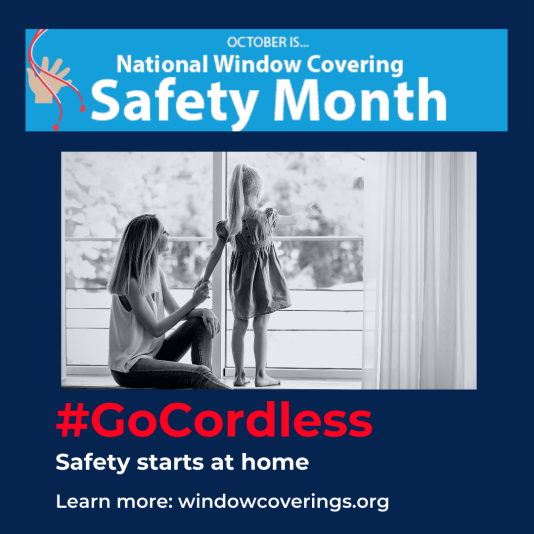Window covering cords are one of the top five hidden hazards in the home according to the U.S. Consumer Product Safety Commission (CPSC), and to increase awareness of the potential strangulation hazard that exposed cords can present to young children, October is National Window Covering Safety Month. The Window Covering Safety Council (WCSC) is encouraging parents and caregivers to use only cordless window covering products or those that have inaccessible cords in homes with young children. This year’s National Window Covering Safety Month theme is: Safety Starts at Home – Go Cordless.
“With families spending more time at home because of the COVID-19 pandemic, it is especially important for parents and caregivers to do a safety check to ensure their childproofing is up-to-date, including checking that their window coverings are safe for young children,” said WCSC Executive Director Peter Rush.
It’s easy to identify window covering products that are safer for homes with young children. Consumers should look for products marked with the Best For Kids™ logo. Products marked with this logo either have no cords, no operating cords or inner cords that are not accessible or are also unable to create a hazardous loop. Best For Kids™ products are required to be tested by a third-party. Shoppers can find Best for Kids™ labeled products at all major US retailers.
It’s also now easier than ever for families to “Go Cordless.” A new window covering safety standard went into effect in 2018 requiring all window covering stock products (products commonly sold in retail stores and online that are completely or substantially pre-assembled in advance) to be cordless or have inaccessible cords to reduce the potential strangulation hazard that exposed cords can present to young children.
“National Window Covering Safety Month is an opportunity for parents and caregivers to check the safety of their window coverings,” said Rush. “The window covering industry, CPSC and safety advocates all agree that only cordless window coverings or window coverings with inaccessible cords should be used in homes with young children.”
The Window Covering Safety Council recommends the following guidelines for window covering safety:
- Install only cordless window coverings or those with inaccessible cords in homes with young children. Replace window blinds and corded shades with products that are cordless or have inaccessible cords marked with the Best for Kids™ certification label.
- If the corded window coverings can’t be replaced with today’s safer products at this time, parents and caregivers should check for the following:
- Keep all window covering cords well out of the reach of children. Eliminate any dangling cords.
- Move all cribs, beds, furniture and toys away from windows and window covering cords, preferably to another wall.
- Make certain that tasseled pull cords are tied up out of reach and as short as possible.
- Continuous-loop cords on draperies and vertical blinds should be permanently anchored to the floor or wall.
- Check that cord stops are properly installed and adjusted to limit the movement of inner lift cords.
For more information on window covering cord safety, visit www.windowcoverings.org. Connect with WCSC on Facebook, Twitter and Instagram for more home safety information and ideas.
###
The Window Covering Safety Council (WCSC) is a coalition of major U.S. manufacturers, importers and retailers of window coverings. The Council assists and supports its members in the industry’s ongoing efforts to encourage the use of cordless products in homes with young children, its redesign of corded products, and to support the national ANSI/WCMA standard for the safety of corded window coverings. WCSC’s activities in no way constitute an assumption of any legal duty owed by its members or any other entity. Consumers seeking more information can visit WCSC’s website at www.windowcoverings.org.

